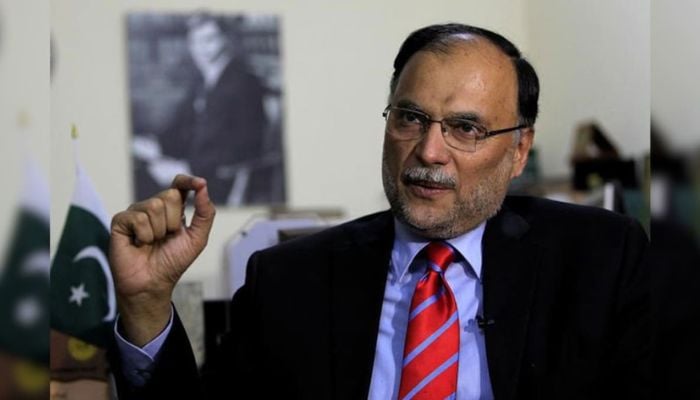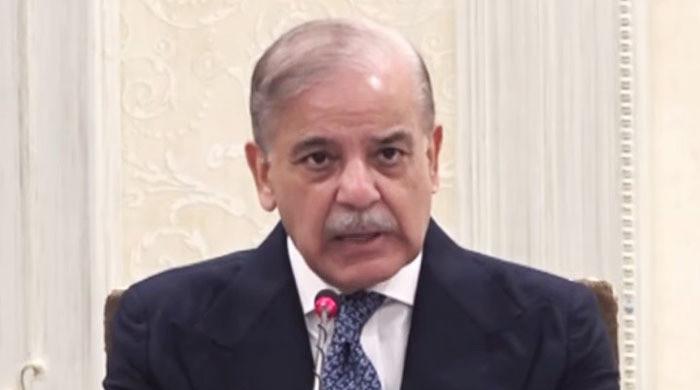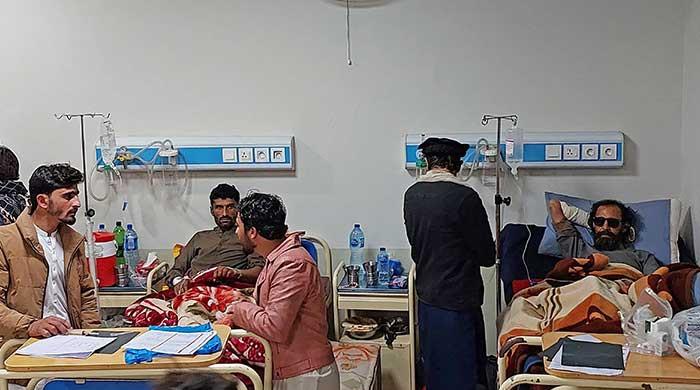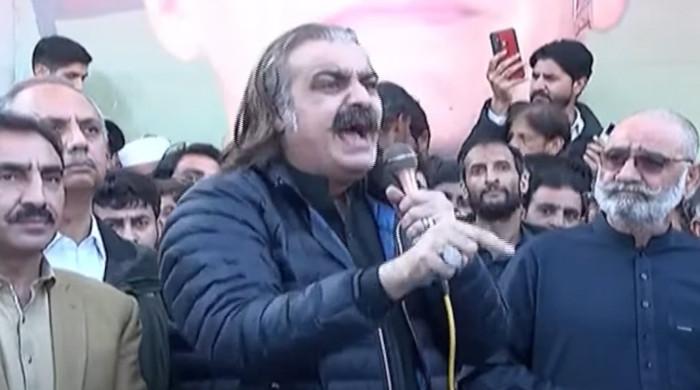'Political instability and policy reversals' bigger challenges than corruption: Ahsan Iqbal
Country on the verge of "complete bankruptcy"; there is an urgent need to sign a Charter of the Economy, says planning minister
June 21, 2022

- Ahsan Iqbal says that corruption is not the dominant driver impeding Pakistan's economic development.
- Says "political instability and policy reversals" are far greater impediments to Pakistan's growth than corruption.
- Admits that his generation is ashamed of not delivering what the country deserved.
ISLAMABAD: Federal Minister for Planning Ahsan Iqbal has stated that corruption is not the dominant driver impeding Pakistan's economic development, citing instances of countries that managed to advance despite corruption levels comparable to Pakistan's, The News reported.
The PML-N leader said that "political instability and policy reversals" were far greater impediments to Pakistan's growth than corruption. According to him, the country is on the verge of "complete bankruptcy", so there is an urgent need to sign a Charter of the Economy to ensure policy continuity and consistency.
At a seminar titled "Grand National Dialogue 2022: Unlocking Pakistan's Economic Potential" hosted by the Islamabad Policy Research Institute (IPRI) on Monday, Iqbal gave a very emotional speech and admitted that his generation is ashamed of not delivering what the country deserved, primarily due to political instability and inconsistency in policy.
He stated that India and Bangladesh had surpassed Pakistan on all economic fronts, prompting us to question what went wrong on our side. He stated that he had supervised Rs3,200 billion in development funds between 2013 and 2018, as well as $29 billion in projects under the China Pakistan Economic Corridor (CPEC), and that if anyone could prove corruption of 32 paisa or 29 cents, he should be declared a national criminal and banned from politics for life.
He said that one former minister was alleged to have gotten kickbacks of Rs70 billion in the construction of the Multan-Sukkur motorway, and as a matter of fact, it was the Chinese side selecting contractors that resulted in the slowing down of the CPEC in totality.
He said that corruption is used as a tool for political victimisation and he was thrown behind bars for the construction of the Sports Complex at Narowal, a project which was approved before he got a ministerial slot during his last tenure.
Iqbal said that the accountability process was used as witch-hunting against opponents and now the situation has got to a level where the bureaucracy is not ready to sign a contract of Rs10. He maintained that the accountability process should be pursued in a transparent and across-the-board fashion.
The minister deplored that he had talked about reducing the usage of tea and it was made a joke. Trolling on social media has become the new normal, he said, adding that the economy is a serious issue which should not be made part of our jokes.
"A difference of opinion should not be used for hatred. Polarisation has reached its apex and I have a bullet in my body as hatred was inculcated into the mind of a young man. Fake news on social media is being used to promote hatred in our society," he said.
The minister said that no investment could be lured until and unless we put our house in order, and that necessitates a consistent policy backed by all the stakeholders.
He regretted that the BRI’s flagship initiative, CPEC, couldn’t take off in Pakistan to this day, owing to political bickering, an unsatisfactory law and order situation, and a trust deficit of sorts between various poles of power.
He recalled his previous government’s efforts in launching Vision 2010, and then again reviving the same policies in 2013 under the Vision 2025 strategy. He, however, said that they could not see the light of the day, and the result was an economic mess before us.
He said that political differences are appreciated in any pluralistic society, but not at the cost of vendetta. He observed that the budget for 2022-23 is no more than a nightmare, and there are hardly any funds at hand to carry on the business of the state as well as development. The enigma is that borrowing is needed to meet day-to-day expenses, and this is detrimental to progress. "The sooner we come out of the debt trap and deficit economy, the better," he said.
He cited the examples of Bangladesh, Vietnam, Cambodia, Laos, and Myanmar to make the point that these fragile economies grew because of a sustained approach, and by winning over the confidence of the international investment market. He pointed out that Pakistan’s foreign direct investment is hardly to the tune of $1.5 billion, whereas there is a cash treasure floating around in the Asian markets soliciting competitive economies.
Ahsan Iqbal remarked that Pakistan has fallen in stature in the last 25 years, and we need to do some deep introspection on this failure. He said that a high growth rate tempts imports, and this is where we fall into the trap of circular debt and a current account deficit. He said that Pakistan is in need of export-led growth, and that too, with a consistent decade-long plan of action. He called for a national consensus on the economy and invited stakeholders across the board to huddle together to bail out the economy and rebuild a sovereign economic edifice.
The seminar was also addressed by Haroon Sharif, former chairman of the Board of Investment; Dr Abid Suleri, Executive Director SDPI; Dr Usman Chohan, Director CASS; Maha Rahman, Director MHRC LUMS; Dr Ikramul Haq, Adjunct Professor LUMS; and Dr Aneel Salman, Chair of Economy IPRI.
Pakistan 'far too dependent'
Former BoI chairman Haroon Sharif proposed a decoupling of the economy from politics. He said that the structure of the economy was not right. He said that borrowing is not an alternative to investment, and investors are discouraged in regions of internal and external conflicts. He said that Pakistan has not been able to attract potential investors because of several inherent flaws, and many of them pertain to our approach towards capital.
Sharif said that Pakistan's over-reliance on essential imports needs to change. "Policy inconsistency, lack of dispute resolution capabilities and conditions inconducive to growth at large are challenges Pakistan needs to address," he observed.
"It is our job to grow. A stable Pakistani economy is only in our interests — foreign investors will only want their money back. We need to diversify our pool of aid," he said.
Haroon Sharif lamented that we are far too dependent on multilateral agencies controlled by Western powers.
He said that the future of world finances is in Asia rather than Europe. He categorically mentioned the sovereign funds of Qatar, the UAE, Abu Dhabi, Kazakhstan, and China that stand to the tune of hundreds of billions of dollars, and advised that they need to be tapped.
He gave the example of DIFC in the UAE and said that investors should not be conditioned under national laws, and a system as in vogue in Dubai should be introduced for investors and setting up economic zones.
FBR often an 'impediment'
Dr Ikramul Haq spoke at length about the trial and error story of the taxation system in Pakistan. He eloquently made a case as to how provinces and the federation had been at odds, and how a system was yet to be designed for fair collection of revenue.
He told the participants that the real dilemma of taxation lies in its dichotomy in vogue. He said that businessmen claim that they want to pay taxes properly, but the FBR often acts as an impediment.
This is why allegations of institutional harassment on the part of FBR and the lack of a speedy redressal system need to be addressed. He said that sales tax is a textbook example of dishonesty in our taxation network.
Dr Haq remarked that the judicial system also needs to be revamped. "Rather than having multiple hearings in different courts, a national tax court would be better," he said. "This would help keep the tax system running smoothly."











